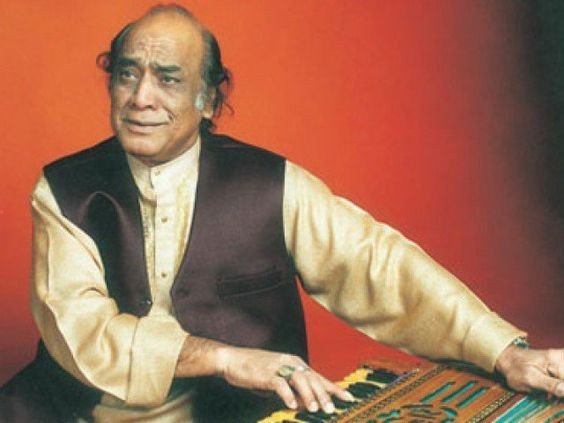Mehdi Hassan Khan was a Pakistani ghazal and playback singer. One of the greatest and most influential figures in the history of ghazal singing, he is famously known as the “King of Ghazal” or the “Shahanshah-e-Ghazal”. Known for his “haunting” baritone voice, Mehdi Hassan is credited with bringing ghazal singing to a worldwide audience. He was born on 18th July 1927 in Luna, Rajasthan, India. Today is Mehdi Saab’s birth anniversary.
I was fortunate to have met the maestro sometime in 1989–90 when he came to Mumbai. He was staying at some place in Lokhandwala, Andheri. We had a very interesting conversation which I wish to share with you.
Mehdi Hassan saab said, when he was very young, may be about 5–6 years old, he was staying with his grandfather (Dadujaan). In those days, mothers used to come with their crying infants who had “Dhaman ki beemari” (heavy breathing) to meet Dadujaan. Dadujaan would promptly take the child in his lap and sing a verse (antra) of a particular song and the child would stop crying and recover from heavy breathing. Mothers would feel happy, thank the old man and leave.
This activity had become a routine and everyday many mothers would come with their infants and dadujaan would sing the same verse and the child will recover. Young Mehdi would keep observing this and overtime could also remember the song and the ritual.
One afternoon, the grandpa was away in the market and a mother came rushing with her child crying and breathing heavily. Mother was restless and was desperately looking for dadujaan’s help. Little Mehdi was home and he could see the restlessness in the mother who was also crying as her infant was suffering.
Dadu was going to take some more time. Mehdi wondered if he could help, so he asked the mother to place the child in his lap. The desperate mother did that. Mehdi sang the same verse that his Dadu would sing but there was no effect on the child’s breathing or crying. Mehdi sang the song one more time, again and the fourth time with no apparent effect. Then Mehdi also started crying….and crying out loud.
Meanwhile Dadu returned from the market to see three of them crying — the mother, the infant and Mehdi. He immediately took the child in his lap and sang the same verse. Child stopped crying…his breathing became normal…mother stopped crying too and was now happy, thanked Dadu and left.
But Mehdi continued crying. Dadu smiled and took him in his lap and asked why was he crying? Mehdi responded in the midst of hiccups….”Dadu, I sang those same verse in the same tune but the kid was not cured. Then you sang the same verse in the same tune and the child was cured. Why?”
Dadu smiled at the sheer innocence of Mehdi. He placed his hand on Mehdi’s head, kissed his forehead.
He said, “ बेटा, अपनी ज़ुबान में वो इल्म लाने के लिए रोज़े रखने पड़ते हैं। आंखो का रोज़ा, कान का रोज़ा, ज़ुबान का रोज़ा, दिमाग का रोज़ा। तब जाके आपमें वो बात आती है कि आप जो भी सोचो, जो भी चाहो वो हो जाता है। अगर आप को ये इल्म पैदा करना है तो ये रोज़े रखने पड़ेंगे। “
(My son, in order to get that effect in your words, one has to observe celibacy. Celibacy of eyes, of ears, of words and of thoughts. Only then will you get the power and effect in your words that whatever you wish will happen)
Listening to this, I was overwhelmed and told Mehdi Hassan saab that what you spoke about Roza in Islam is what Hinduism talks about Brahmacharya (Celibacy). He smiled and said…All roads lead to Rome!
Happy Birth Anniversary Ustad Mehdi Hassan Saab!!!
I am reminded of Mehdi Hassan’s famous ghazal –
रंजिश ही सही दिल ही दुखाने के लिये आ ( Ranjish hi sahi dil hi dukhaane ke liye aa: Let it be anguish, come at least to torment my heart)

